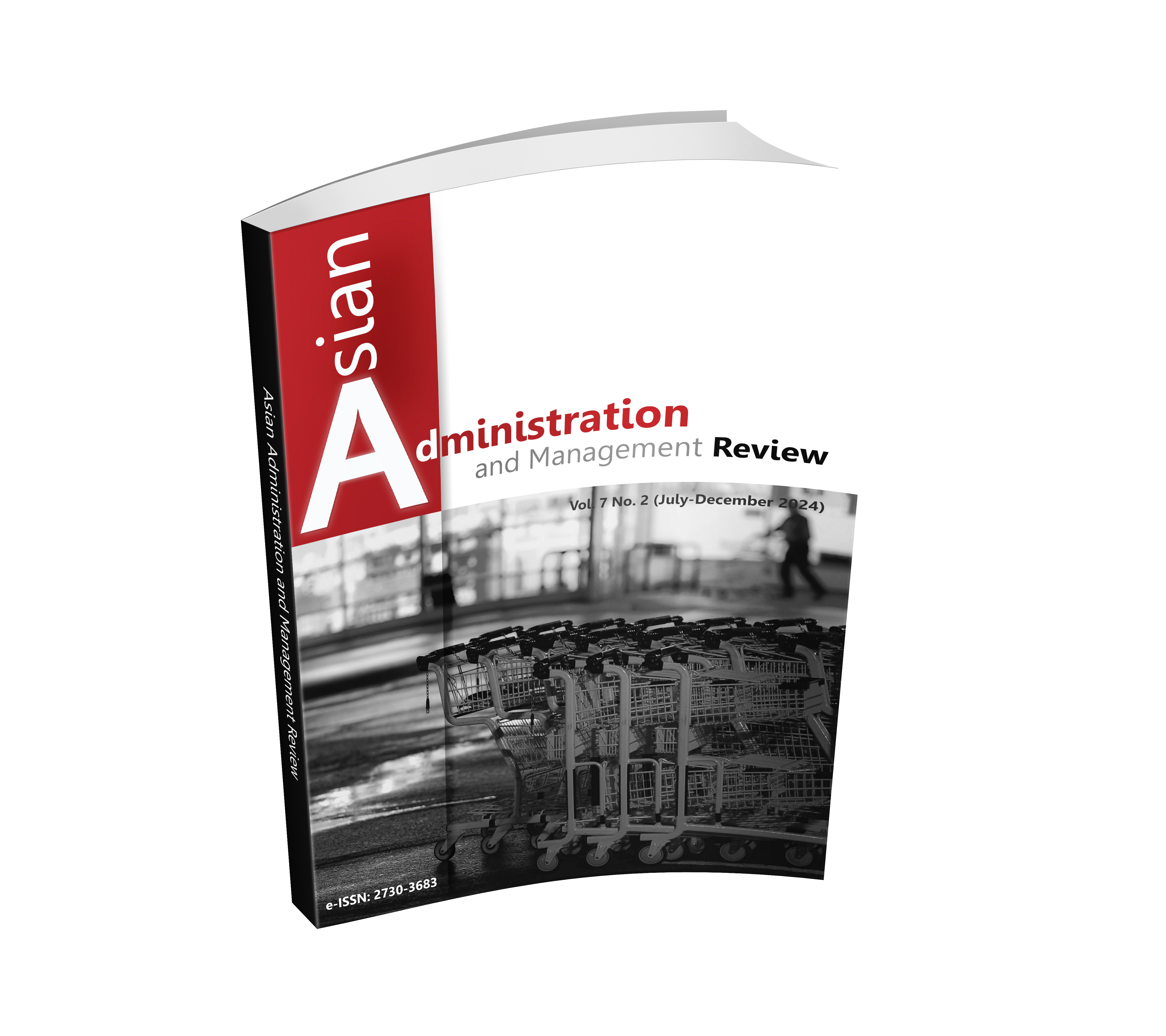STRUCTURAL EQUATION MODELING OF CAUSAL RELATIONSHIPS OF FACTORS AFFECTING THE SUSTAINABLE SUCCESS OF HANDICRAFT COMMUNITY ENTERPRISES IN THE CENTRAL REGION OF THAILAND
DOI:
https://doi.org/10.14456/aamr.2024.33Keywords:
Leadership, Group Culture Based on the Philosophy of Sufficiency Economy, Engagement, Sustainable Success, Handicraft Community EnterprisesAbstract
Community enterprises play a crucial role in the economic and social development of communities. To promote their effective operation, it is essential to emphasize leadership, and a group culture based on the philosophy of sufficiency economy to enhance the success of community enterprises. Therefore, this research aims to develop a structural equation model of the causal relationships of factors affecting the sustainable success of handicraft community enterprises in the central region of Thailand. The sample consists of 420 members from handicraft community enterprises in the central region, selected through multi-stage random sampling. Data were collected using questionnaires and analyzed using structural equation modeling. The results indicated that leadership, group culture based on the sufficiency economy philosophy, and engagement positively affected the sustainable success of community enterprises. Additionally, leadership and group culture based on the sufficiency economy philosophy positively affected member engagement. Leadership also positively affected the group culture based on the sufficiency economy philosophy, with a statistical significance level of .05.
Downloads
References
Çetinkaya, B., & Yeşilada, T. (2022). Inclusive leadership and employee innovative work behaviours: Testing a psychological empowerment and leader-member exchange moderated-mediation model. Journal of Psychology in Africa, 32(1), 15-20.
Chunnui, C., & Lapthananon, P. (2019). Community Enterprise Success on the Basis Viability and Sufficiency. Academic and Research Journal of Liberal Arts, 14(1), 67-78.
Eduzor, N. (2024). Leadership Styles and Organizational Performance: Examining the Impact of Transformational Leadership on Employee Engagement and Business Success. International Journal of Development, Sustainability and Environmental Management, 4(1), 16-24.
Frankel, A., Leonard, M., & Denham, C. (2006). Fair and Just Culture, Team Behavior, and Leadership Engagement: The Tools to Achieve High Reliability. Health Services Research, 41(4p2), 1690-1709.
Hair, J., Ringle, C., & Sarstedt, M. (2014). Editorial Partial Least Squares Structural Equation Modeling: Rigorous Applications, Better Results and Higher Acceptance. Long Range Planning, 47(6), 392-403.
Hatala, J., & Gumm, J. (2006). Managing organizational cultural influences during the implementation of competency-based training. Advances in Developing Human Resources, 8(2), 229-246.
Hooper, D., Coughlan, J., & Mullen, M. (2008). Structural Equation Modeling: Guidelines for Determining Model Fit. Electronic Journal of Business Research Methods, 6(1), 53-60.
House, R., Hanges, P., Ruiz-Quintanilla, S., Dorfman, P., Javidan, M., Dickson, M., & Gupta, V. (1999). Cultural influences on leadership and organizations: Project GLOBE. In W. Mobley, M. Gessner, & V. Arnold. (eds.). Advances in Global Leadership (pp. 171- 233). Yorkshire: Emerald Group Publishing Ltd.
Insan, A., & Masmarulan, R. (2021). Effects of leader-member exchange and organizational culture on work engagement and employee performance. Management Science Letters, 11, 879-886.
Jerab, D., & Mabrouk, T. (2023). The Role of Leadership in Changing Organizational Culture. Retrieved from https://ssrn.com/abstract=4574324.
Kayani, B. (2023). Impact of Organisational Culture on Organisational Commitment: Evidence from Pakistan. Journal of Accounting Business and Management, 30(1), 86-96.
Khan, N. (2013). Employee Engagement Drivers for Organizational Success. Global Journal of Management and Business Studies, 3(6), 675-680.
Kline, R. (2011). Principles and Practice of Structural Equation Modeling. New York: Guilford Press.
Madhukar, V., & Sharma, S. (2017). Organisational Climate: A Conceptual Perspective. International Journal of Management, IT & Engineering, 7(8), 276-293.
Mazzetti, G., & Schaufeli, W. (2022). The impact of engaging leadership on employee engagement and team effectiveness: A longitudinal, multi-level study on the mediating role of personal- and team resources. PLoS ONE, 17(6), e0269433.
Pimta, L. (2024). Increasing the Accounting Capacity of People in the Community to Upgrade Them to Become Community Entrepreneurs through the Process of Career Promotion to Reduce the Cost of Accounting in Occupation. Journal of Management Science, Ubon Ratchathani University, 13(1), 83-107.
Praphaiphet, S., Kundaeng, S., Loetvathong, R., & Praphaiphet, S. (2023). Leadership: Concepts, Theories, and Elements. Journal of Intellect Education, 2(1), 59-73.
Schuetz, A. (2016). Effective Leadership and its Impact on an Organisation’s Success. Journal of Corporate Responsibility and Leadership, 3(3), 73-90.
Schumacker, R., & Lomax, R. (2016). A Beginner’s Guide to Structural Equation Modeling. 4th ed. New York: Routledge.
Sriphong, C. (2024). Implementation of the Causal Model of Business Performance of Community Enterprises Producing Processed Agricultural Products in the Three Southern Border Provinces. Thai Interdisciplinary and Sustainability Review, 13(1), 184-194.
Warrick, D., & Gardner, D. (2021). Leaders Build Cultures: Action Steps for Leaders to Build Successful Organizational Cultures. Journal of Leadership Accountability and Ethics, 18(1), 37-53.
Woodhead, V. (2011). How does coaching help to support team working? A case study in the NHS. International Journal of Evidence Based Coaching and Mentoring, 5(Special Issue), 102-119.
Xenikou, A. (2022). Leadership and organizational culture. In C. Newton, & R. Knight. (ed.). Handbook of Research Methods for Organisational Culture (pp. 23-38). Cheltenham: Edward Elgar Publishing.
Yoodee, S., Lapi-e, A., & Puakkong, C. (2022). The Application of “Dhammic Socialism” by Buddhadasa Bhikkhu'stowardlocal Governance for Administrators of Sub-District Administration Organization in Suratthaniprovince. Journal of Social Science and Buddhistic Anthropology, 7(8), 229-244.
Zanabazar, A., Deleg, A., Ravdan, M., & Erdene, E. (2023). The Relationship between Mathematics Anxiety and Mathematical Performance among Undergraduate Students. Jurnal Ilmiah Peuradeun, 11(1), 309-322.

Downloads
Published
How to Cite
Issue
Section
License
Copyright (c) 2024 Authors

This work is licensed under a Creative Commons Attribution-NonCommercial-NoDerivatives 4.0 International License.











.png)


